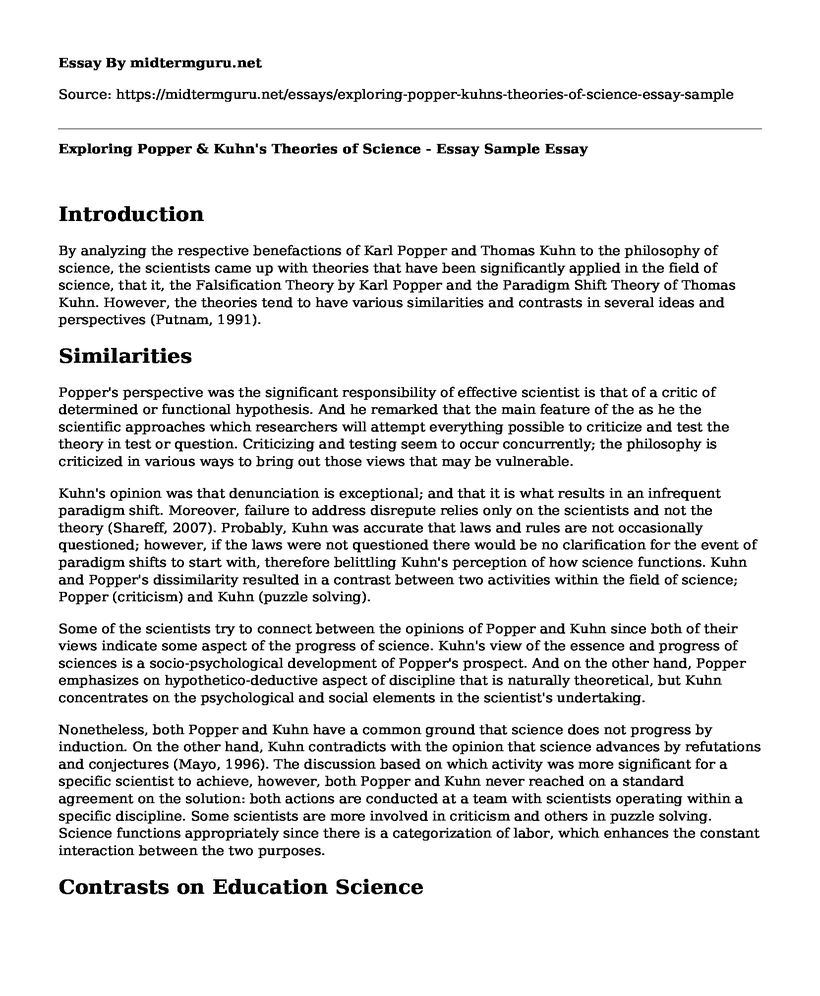Introduction
By analyzing the respective benefactions of Karl Popper and Thomas Kuhn to the philosophy of science, the scientists came up with theories that have been significantly applied in the field of science, that it, the Falsification Theory by Karl Popper and the Paradigm Shift Theory of Thomas Kuhn. However, the theories tend to have various similarities and contrasts in several ideas and perspectives (Putnam, 1991).
Similarities
Popper's perspective was the significant responsibility of effective scientist is that of a critic of determined or functional hypothesis. And he remarked that the main feature of the as he the scientific approaches which researchers will attempt everything possible to criticize and test the theory in test or question. Criticizing and testing seem to occur concurrently; the philosophy is criticized in various ways to bring out those views that may be vulnerable.
Kuhn's opinion was that denunciation is exceptional; and that it is what results in an infrequent paradigm shift. Moreover, failure to address disrepute relies only on the scientists and not the theory (Shareff, 2007). Probably, Kuhn was accurate that laws and rules are not occasionally questioned; however, if the laws were not questioned there would be no clarification for the event of paradigm shifts to start with, therefore belittling Kuhn's perception of how science functions. Kuhn and Popper's dissimilarity resulted in a contrast between two activities within the field of science; Popper (criticism) and Kuhn (puzzle solving).
Some of the scientists try to connect between the opinions of Popper and Kuhn since both of their views indicate some aspect of the progress of science. Kuhn's view of the essence and progress of sciences is a socio-psychological development of Popper's prospect. And on the other hand, Popper emphasizes on hypothetico-deductive aspect of discipline that is naturally theoretical, but Kuhn concentrates on the psychological and social elements in the scientist's undertaking.
Nonetheless, both Popper and Kuhn have a common ground that science does not progress by induction. On the other hand, Kuhn contradicts with the opinion that science advances by refutations and conjectures (Mayo, 1996). The discussion based on which activity was more significant for a specific scientist to achieve, however, both Popper and Kuhn never reached on a standard agreement on the solution: both actions are conducted at a team with scientists operating within a specific discipline. Some scientists are more involved in criticism and others in puzzle solving. Science functions appropriately since there is a categorization of labor, which enhances the constant interaction between the two purposes.
Contrasts on Education Science
The Views of Popper
- Instructors need to motivate objectivity, the building of problem-solving skills and logical reasoning. In teams, learners can be convinced to suggest theories and via debate attempt to falsify some of the theories by others to facilitate the learning and tutoring of science exciting and compelling.
- Instructors have to promote actual comprehension of science among students that all science is tentative, and continuously are made to innovate more relevant ideas via critical thinking and research.
The Views of Kuhn
- Instructors need to assist the learner in attaining knowledge in science via an integration of problem-solving science functions. Learners have to be provided with relevant apparatus and experiments and shown how to recommend scrutiny and conclusions; since continuous inspections and testing will facilitate them into innovating and identifying various things for themselves.
- Instructors have to be role models for learners and guiding them appropriately.
References
Mayo, D. G. (1996). Ducks, rabbits, and normal science: Recasting the Kuhn's-eye view of Popper's demarcation of science. The British Journal for the Philosophy of Science, 47(2), 271-290. https://www.researchgate.net/publication/249253810_Ducks_Rabbits_and_Normal_Scie
Putnam, H. (1991). The "corroboration" of theories. The Philosophy of Science, 121-137. www.uab.cat/servlet/BlobServer?blobtable=Document&blobcol.../pdf.
Shareff, R. (2007). Want better business theories? Maybe Karl Popper has the answer. Academy of Management Learning & Education, 6(2), 272-280. https://www.researchgate.net/.../291958506_Want_better_business_theories_Maybe_Kar.
Cite this page
Exploring Popper & Kuhn's Theories of Science - Essay Sample. (2023, Jan 26). Retrieved from https://midtermguru.com/essays/exploring-popper-kuhns-theories-of-science-essay-sample
If you are the original author of this essay and no longer wish to have it published on the midtermguru.com website, please click below to request its removal:
- MBA Final Project Preparation: Qualitative and Quantitative Research
- Essay on Social Ethics in Action
- Philosophy Essay Example: Ethical Dilemma
- Politics Essay Sample: Political Geography and Theoretical Models
- Chemistry Paper Example on Hydrogen Element
- Effective and Reflective Practices in Mathematics - Paper Example
- Ferric Chloride as the Best Catalyst in Chlorobenzenes Production







